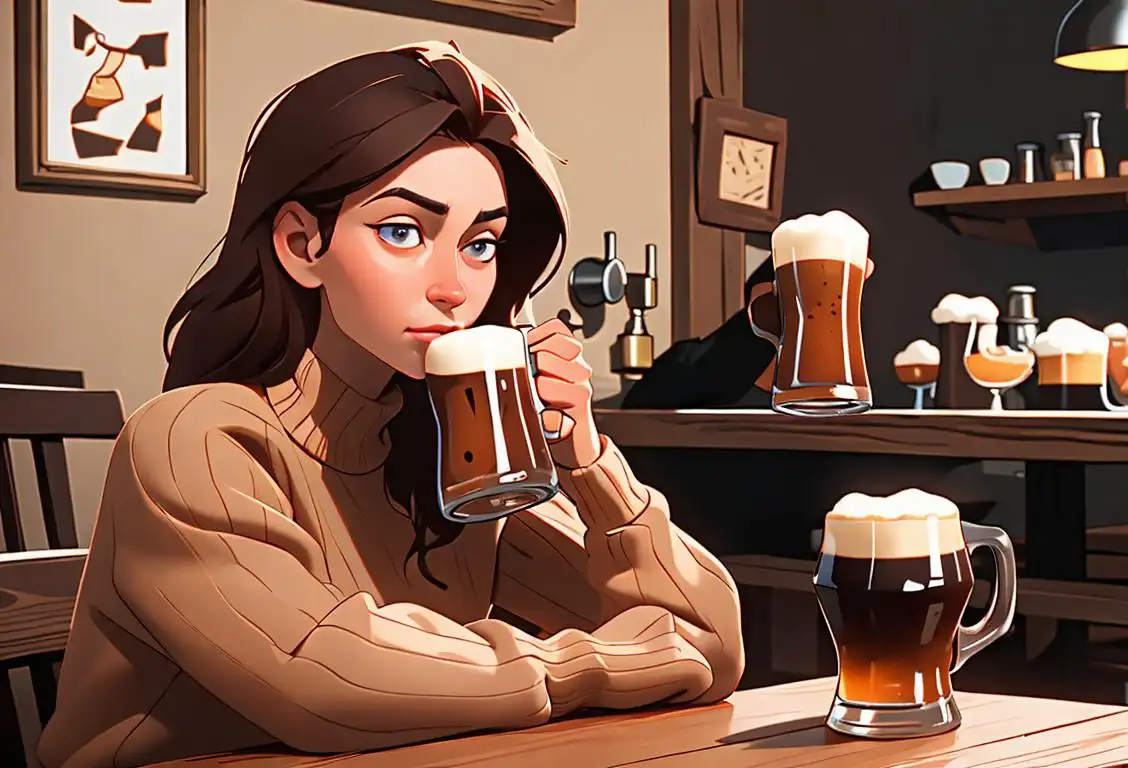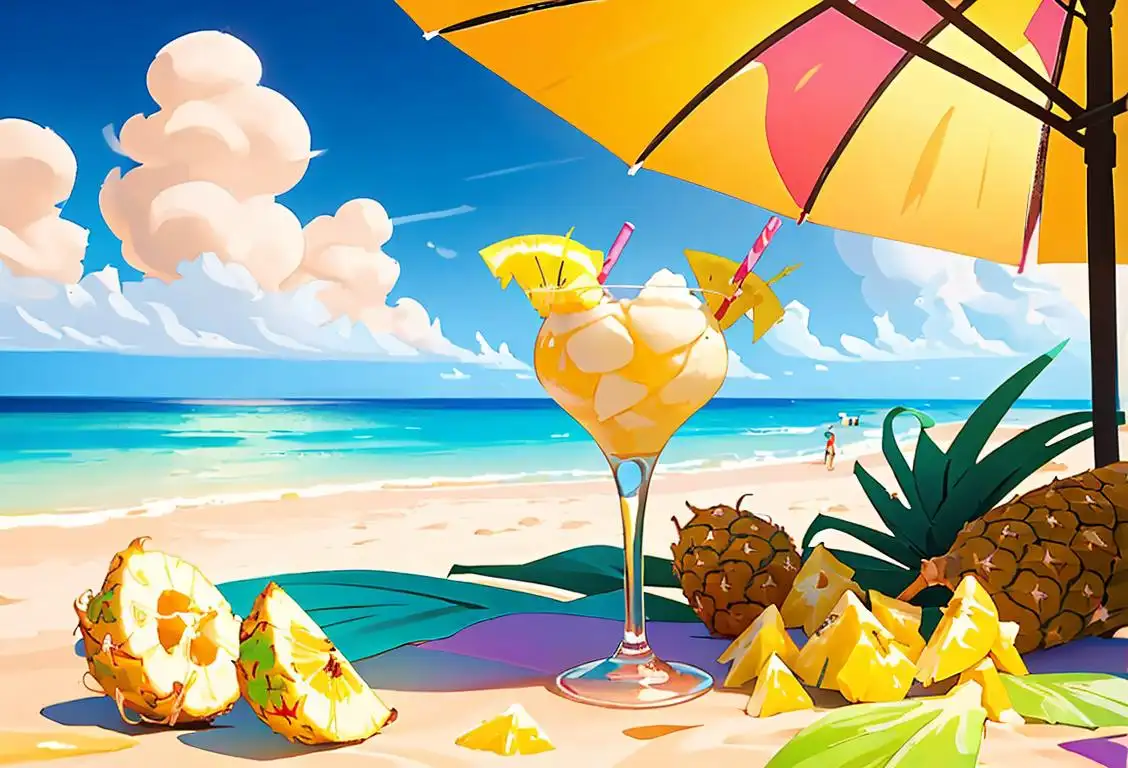National Coffee Drink A Beer Day

Did you know that there's a day dedicated to celebrating the best of both worlds? National Coffee Drink a Beer Day, observed on September 29th each year, combines the love for coffee and beer into one tasty celebration. So grab your favorite brew and get ready to enjoy a unique blend of flavors!
When is Coffee Drink A Beer Day?
It's national coffee drink a beer day on the 29th September.
The Origins of National Coffee Drink a Beer Day
While the exact origins of National Coffee Drink a Beer Day remain a bit of a mystery, we can certainly appreciate the genius behind it. Coffee and beer are two beloved beverages that have gained a massive following worldwide. Whether you're a coffee connoisseur who can't start the day without a strong cup of Joe or a beer lover who enjoys unwinding with a cold brew, this special day offers a chance to indulge in both of your favorite drinks.
It's no surprise that coffee and beer have become such popular drinks. Coffee provides a much-needed energy boost in the mornings, while beer is the perfect companion for social gatherings or relaxing evenings. National Coffee Drink a Beer Day celebrates the joy of savoring different flavors while bringing people together.
Celebrating National Coffee Drink a Beer Day
There are many ways to celebrate National Coffee Drink a Beer Day. Here are a few ideas to make the most of this unique occasion:
- Visit a local coffee shop that also serves craft beer. This is the perfect opportunity to sample their delicious offerings and support local businesses.
- Host a coffee and beer pairing party. Invite friends over and experiment with different combinations to find the perfect flavor synergy.
- Try a coffee-infused beer. Many breweries nowadays offer specialty brews that incorporate the rich flavors of coffee.
- Get creative in the kitchen. Use coffee or beer as an ingredient in your favorite recipes, such as coffee-infused barbecue sauce or beer-battered onion rings.
- Share your love for National Coffee Drink a Beer Day on social media using the hashtag #CoffeeDrinkABeerDay. Spread the word and join the conversation!
Fun Fact About National Coffee Drink a Beer Day
Did you know that coffee has a natural bitterness that can balance the sweetness in certain beers? This is why coffee-infused stouts and porters have become increasingly popular among beer enthusiasts.
History behind the term 'Coffee Drink A Beer'
15th century
Discovery of coffee
Coffee was first discovered in the 15th century in the Ethiopian highlands. According to legend, a goat herder named Kaldi noticed that his goats became more energetic and lively after consuming certain berries. He shared this discovery with the local monks who then experimented with the berries and found they could stay awake and alert during long hours of prayer.
1475
The Discovery of Coffee
Coffee was first discovered in the 9th century in Ethiopia, but it wasn't until 1475 that the term 'coffee drink' began to be widely used. Coffee drinking spread rapidly across the Arabian Peninsula and became an integral part of the Arabian culture. Arab scholars embraced coffee as a stimulating drink that aided in their intellectual pursuits.
1615
The birth of coffee culture
Coffee was introduced to Europe, and its popularity quickly spread throughout cafes and households. The coffeehouse culture became an integral part of social life in many European countries, serving as meeting places for intellectuals, artists, and businessmen.
1475
Discovery of coffee
In the year 1475, the vibrant history of coffee begins with its discovery in the Kingdom of Kaffa (located in modern-day Ethiopia). Legend has it that a goat herder named Kaldi noticed his goats becoming lively and energetic after consuming certain berries from a certain tree. Intrigued, he tried the berries himself and experienced a newfound burst of energy. The stimulating properties of coffee were thus realized, setting the stage for its future as a popular beverage.
1516
The Reinheitsgebot and German Brewing Culture
In 1516, the Reinheitsgebot, also known as the German Beer Purity Law, was enacted, which allowed only water, barley, and hops to be used in brewing beer. This law had a major impact on the German brewing culture and contributed to the high quality and consistency of German beers. The Reinheitsgebot laid the foundation for the term 'beer' to be associated with traditional brewing methods and purity.
1738
The rise of beer gardens
Beer gardens emerged in Germany as communal gathering places where people could enjoy fresh air, music, and, of course, beer. These open-air establishments became synonymous with socializing and relaxation.
1511
Introduction of coffee in Europe
It wasn't until the year 1511 that coffee made its way to Europe thanks to traders from the Middle East. The first known coffee house was established in the city of Constantinople (now Istanbul) in the Ottoman Empire. The coffee house quickly became a social hub, where people gathered to enjoy this new and exotic beverage, sparking a cultural phenomenon that would soon spread across European cities.
16th century
Introduction of coffee to Europe
Coffee made its way to Europe during the 16th century, thanks to trade routes. Venetian merchants were the first to introduce coffee beans to the continent. They brought coffee from the Ottoman Empire and started the trend of drinking coffee in Europe. Initially, coffee was consumed only in the elite circles as a luxurious and exotic beverage.
1607
Coffee in the New World
The year 1607 saw the introduction of coffee to the New World. The first coffee plant was planted in the colony of Virginia in what would later become the United States. From there, coffee cultivation spread further throughout the Americas, leading to the establishment of coffee plantations in the Caribbean and South America. Coffee began to solidify its position as a global commodity, fueling international trade and shaping the economies of various countries.
1878
The fusion of two beloved beverages
In Vienna, Austria, the idea of combining coffee with beer was born. Known as 'Kaffee Bier,' this unique drink was created by mixing dark beer with strong black coffee. It quickly gained popularity among locals, who appreciated the bold and contrasting flavors.
17th century
The birth of coffeehouse culture
During the 17th century, coffeehouses sprouted across Europe, particularly in major cities like London, Paris, and Vienna. These coffeehouses quickly became popular social gathering places where people would engage in lively discussions, share news, and exchange ideas. Coffeehouses played a pivotal role in the Enlightenment movement, fostering intellectual and cultural exchanges among writers, philosophers, and artists.
1871
The Rise of Coffeehouses in England
During the 18th century, coffeehouses gained popularity in England as places for socializing, intellectual discussions, and the consumption of coffee. These establishments became synonymous with the term 'coffee drink,' as they were the primary venues for people to enjoy a cup of coffee and engage in lively conversations. Coffeehouses played a vital role in shaping the intellectual and cultural landscape of England.
18th century
Introduction of beer coffee drinks
In the 18th century, beer coffee drinks gained popularity in Europe. One such drink, known as 'Kaffee Bier,' emerged in Germany. It was a combination of beer and coffee, often sweetened and flavored with spices. This brew became a favorite among social circles, offering a unique blend of flavors from both the coffee and beer worlds.
1951
The birth of the term 'coffee drink a beer'
The term 'coffee drink a beer' emerged in post-World War II Germany. It became a common expression used to describe the act of having a beer after enjoying a cup of coffee. The phrase exemplified the desire for relaxation and camaraderie, reflecting the German tradition of enjoying both beverages in different settings.
1920
Prohibition and the Emergence of Speakeasies
In 1920, the United States implemented Prohibition, which banned the production, sale, and transportation of alcoholic beverages. This led to the rise of 'speakeasies' - illegal bars that operated covertly. Customers often resorted to ordering coffee as a cover, while secretly receiving alcohol, thereby creating a link between the terms 'coffee drink' and 'beer' in the context of illicit drinking during the Prohibition era.
1881
Birth of the modern beer industry
In the year 1881, the modern beer industry witnessed a significant milestone with the invention of the first mechanical beer tap. This invention revolutionized the way beer was served, making it more accessible and convenient. As a result, the popularity of beer soared, and breweries began to flourish around the world, with various styles and flavors emerging to cater to diverse consumer preferences.
20th century
Modern variations and regional specialties
During the 20th century, coffee beer drinks continued to evolve and diversify. Different regions began experimenting with their own unique variations. For example, in the United States, craft breweries started producing coffee-infused beers, creating rich and complex flavors combining the bitterness of coffee with the malty sweetness of beer. In South America, a popular coffee cocktail called 'Café Bombón' emerged, combining espresso with condensed milk.
Present
Continued enjoyment
The term 'coffee drink a beer' continues to be used today, symbolizing the enjoyment of both coffee and beer as distinct experiences. Whether it's taking a moment to savor a cup of coffee before the day begins or unwinding with friends over a beer, this phrase captures the essence of appreciating the simple pleasures in life.
1920
Prohibition and speakeasies
The year 1920 marks the start of the Prohibition era in the United States, when the production, sale, and distribution of alcoholic beverages were banned. However, this didn't stop people from finding ways to enjoy their favorite beverage. Speakeasies, underground establishments where illegal alcohol was served, became popular clandestine gathering spots. During this time, coffee houses also played a significant role in offering a social setting for people to gather and enjoy non-alcoholic alternatives like coffee, which further cemented its cultural significance.
2021
A Playful Fusion of Cultures
In recent years, the term 'coffee drink a beer' has gained popularity as a playful phrase that merges two culturally significant beverages. It embodies a sense of camaraderie and enjoyment, emphasizing the social aspect of both coffee and beer drinking. It serves as a reminder of the diverse and ever-evolving nature of our culinary traditions, as well as the interconnectedness of different cultures and their respective drinking habits.
Present day
Coffee beer festivals and celebrations
In the present day, coffee beer has become a celebrated fusion of flavors. Many countries now host coffee beer festivals where breweries showcase their innovative creations. These festivals attract coffee and beer enthusiasts from around the world, providing a platform for collaboration and exploration of new taste experiences. Coffee beer has gained recognition as a distinct subcategory within the craft beer industry and continues to captivate adventurous palates.
Present
The fusion of coffee and beer
In recent years, there has been a growing trend of blending the flavors of coffee and beer. Craft breweries and specialty coffee roasters have collaborated to create unique and innovative beverages that combine the rich, roasted flavors of coffee with the refreshing qualities of beer. This fusion has given rise to various styles such as coffee stouts, porters, and even coffee-infused IPAs. Coffee drink a beer has become an exciting and popular choice among beverage enthusiasts, offering a harmonious marriage of two beloved beverages.
Did you know?
Did you know that coffee has a natural bitterness that can balance the sweetness in certain beers?Tagged
food funFirst identified
29th September 2015Most mentioned on
29th September 2015Total mentions
48Other days
Bacon Day
Sweet Tea Day
Medal Of Honor Day
Iced Tea Day
Pumpkin Day
Guac Day
Vodka Day
Foundation Day
Cheese Pizza Day
Pina Colada Day









